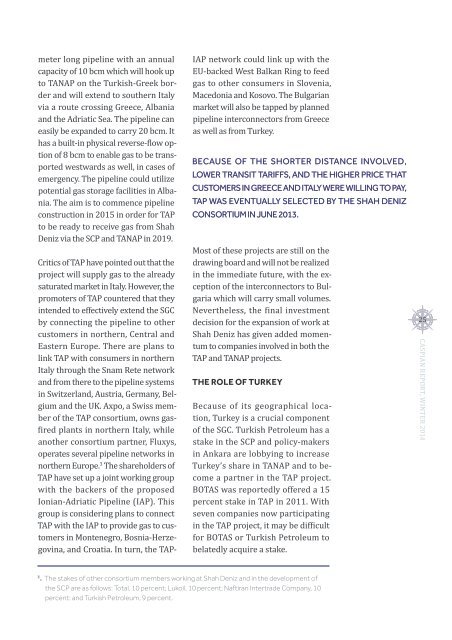Caspian Report - Issue 06 - Winter 2014
You also want an ePaper? Increase the reach of your titles
YUMPU automatically turns print PDFs into web optimized ePapers that Google loves.
meter long pipeline with an annual<br />
capacity of 10 bcm which will hook up<br />
to TANAP on the Turkish-Greek border<br />
and will extend to southern Italy<br />
via a route crossing Greece, Albania<br />
and the Adriatic Sea. The pipeline can<br />
easily be expanded to carry 20 bcm. It<br />
has a built-in physical reverse-flow option<br />
of 8 bcm to enable gas to be transported<br />
westwards as well, in cases of<br />
emergency. The pipeline could utilize<br />
potential gas storage facilities in Albania.<br />
The aim is to commence pipeline<br />
construction in 2015 in order for TAP<br />
to be ready to receive gas from Shah<br />
Deniz via the SCP and TANAP in 2019.<br />
Critics of TAP have pointed out that the<br />
project will supply gas to the already<br />
saturated market in Italy. However, the<br />
promoters of TAP countered that they<br />
intended to effectively extend the SGC<br />
by connecting the pipeline to other<br />
customers in northern, Central and<br />
Eastern Europe. There are plans to<br />
link TAP with consumers in northern<br />
Italy through the Snam Rete network<br />
and from there to the pipeline systems<br />
in Switzerland, Austria, Germany, Belgium<br />
and the UK. Axpo, a Swiss member<br />
of the TAP consortium, owns gasfired<br />
plants in northern Italy, while<br />
another consortium partner, Fluxys,<br />
operates several pipeline networks in<br />
northern Europe. 3 The shareholders of<br />
TAP have set up a joint working group<br />
with the backers of the proposed<br />
Ionian-Adriatic Pipeline (IAP). This<br />
group is considering plans to connect<br />
TAP with the IAP to provide gas to customers<br />
in Montenegro, Bosnia-Herzegovina,<br />
and Croatia. In turn, the TAP-<br />
IAP network could link up with the<br />
EU-backed West Balkan Ring to feed<br />
gas to other consumers in Slovenia,<br />
Macedonia and Kosovo. The Bulgarian<br />
market will also be tapped by planned<br />
pipeline interconnectors from Greece<br />
as well as from Turkey.<br />
BECAUSE OF THE SHORTER DISTANCE INVOLVED,<br />
LOWER TRANSIT TARIFFS, AND THE HIGHER PRICE THAT<br />
CUSTOMERS IN GREECE AND ITALY WERE WILLING TO PAY,<br />
TAP WAS EVENTUALLY SELECTED BY THE SHAH DENIZ<br />
CONSORTIUM IN JUNE 2013.<br />
Most of these projects are still on the<br />
drawing board and will not be realized<br />
in the immediate future, with the exception<br />
of the interconnectors to Bulgaria<br />
which will carry small volumes.<br />
Nevertheless, the final investment<br />
decision for the expansion of work at<br />
Shah Deniz has given added momentum<br />
to companies involved in both the<br />
TAP and TANAP projects.<br />
THE ROLE OF TURKEY<br />
Because of its geographical location,<br />
Turkey is a crucial component<br />
of the SGC. Turkish Petroleum has a<br />
stake in the SCP and policy-makers<br />
in Ankara are lobbying to increase<br />
Turkey’s share in TANAP and to become<br />
a partner in the TAP project.<br />
BOTAS was reportedly offered a 15<br />
percent stake in TAP in 2011. With<br />
seven companies now participating<br />
in the TAP project, it may be difficult<br />
for BOTAS or Turkish Petroleum to<br />
belatedly acquire a stake.<br />
25<br />
CASPIAN REPORT, WINTER <strong>2014</strong><br />
3<br />
. The stakes of other consortium members working at Shah Deniz and in the development of<br />
the SCP are as follows: Total, 10 percent; Lukoil, 10 percent; Naftiran Intertrade Company, 10<br />
percent: and Turkish Petroleum, 9 percent.










